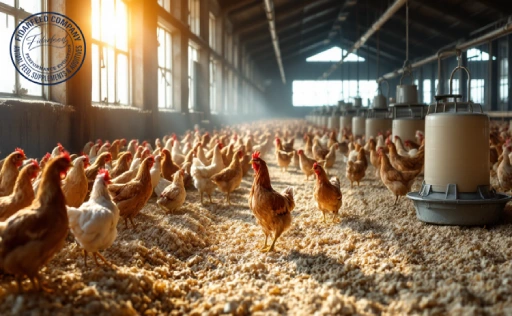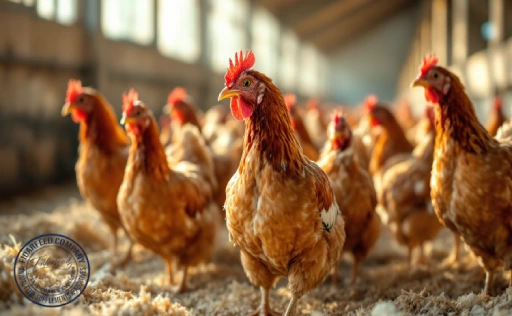Effective waste management is one of the most critical aspects of poultry farming. Not only does it play a vital role in maintaining a hygienic environment, but it also directly impacts the health of the flock and the farm’s profitability. Poultry waste management involves handling and disposing of the waste produced by chickens, ducks, and other poultry, which includes manure, bedding, and other organic materials. If done correctly, it can lead to improved farm efficiency, reduced environmental impact, and even new revenue streams. Let’s dive into the essential poultry waste management tips every farmer should know.
Why Poultry Waste Management Is Crucial for Your Farm’s Success
Poultry waste management isn’t just about keeping the farm clean; it’s about optimizing operations and creating a sustainable environment for both your livestock and the surrounding ecosystem. Poor waste management can lead to health problems for your birds, unpleasant odors, and the contamination of local water supplies. On the other hand, effective waste management helps maintain good animal health, reduces the risk of disease, and ensures that waste is disposed of in an environmentally responsible manner.
Learn more about: Processed Meat Meal
Moreover, proper waste management can make a significant economic difference. Farms that adopt smart waste disposal systems often find that they reduce their costs related to labor, feed, and water while improving farm productivity. The bottom line is, investing time and resources into good poultry waste management will benefit your farm in the long run.
Top Benefits of Effective Poultry Waste Management for Farmers
-
Improved Farm Hygiene
Keeping your poultry housing clean and free from excessive waste is crucial for preventing disease outbreaks. Manure, if left unchecked, can attract pests, produce harmful gases like ammonia, and foster the growth of pathogens. Regular waste removal and proper handling practices reduce these risks significantly. -
Enhanced Animal Health
A clean and well-maintained environment reduces the likelihood of infections, respiratory diseases, and skin irritations in poultry. When waste is properly managed, it helps keep animals healthier, ultimately improving their productivity and reducing veterinary costs. -
Lower Operational Costs
Efficient waste management systems reduce the need for costly labor and disposal methods. Furthermore, by reusing or recycling poultry waste (like converting it into fertilizer), farmers can cut costs and even generate additional income streams. -
Environmental Sustainability
By managing waste properly, farmers can help reduce their carbon footprint. Poultry manure, if handled responsibly, can be transformed into compost or bioenergy, reducing environmental pollution and contributing to a more sustainable farm.
Learn more about: Comprehensive Guide to Salmonella Management in Poultry Farms: Protecting Chickens and Humans
Essential Poultry Waste Management Tips Every Farmer Should Know
-
Regular Waste Removal
One of the simplest ways to ensure good waste management is to remove manure regularly. If left for too long, it can build up and create an unhealthy environment for your poultry. Daily or weekly removal, depending on flock size, will maintain better hygiene and prevent disease. -
Use Proper Bedding Materials
Bedding is essential for absorbing moisture and controlling odor in poultry houses. Materials like straw, sawdust, or wood shavings work well to manage waste. Choose bedding that is absorbent, cost-effective, and easy to handle. Change bedding regularly to keep the environment fresh. -
Proper Storage of Manure
Once removed, poultry manure should be stored properly before disposal or use. Manure piles should be kept covered and ventilated to avoid the release of harmful gases. Ensure that waste is kept away from water sources to prevent contamination. -
Composting Poultry Waste
Composting is one of the most effective ways to handle poultry waste. It breaks down manure into nutrient-rich organic material that can be used to fertilize crops or gardens. Set up a composting system that ensures proper aeration and moisture levels for optimal decomposition. -
Disinfect and Clean Equipment
Clean equipment, such as feeders, waterers, and poultry house floors, regularly to avoid contamination. Disinfecting tools and materials helps prevent the spread of diseases and keeps your poultry in optimal health.
How to Turn Poultry Waste into Valuable Resources for Your Farm
Poultry waste doesn’t have to be a burden. With the right approach, it can be transformed into valuable resources:
-
Organic Fertilizer: Poultry manure is rich in nitrogen, phosphorus, and potassium—key nutrients for plant growth. By composting or drying the manure, farmers can create organic fertilizer that improves soil fertility. This is an excellent way to reduce fertilizer costs and enrich the farm’s soil.
-
Bioenergy Production: Poultry waste can be used to produce biogas through anaerobic digestion. This process generates methane, which can be used as an energy source for heating poultry houses or other farm operations. The use of bioenergy helps lower your energy costs and reduce reliance on external energy sources.
Learn more about: Smart Chicken Waste Management: Sustainable Solutions for Poultry Farmers
-
Animal Feed: Poultry waste, when processed correctly, can also be repurposed as animal feed for non-poultry livestock. However, it’s important to ensure proper treatment to eliminate pathogens and toxins before repurposing waste for animal consumption.
Common Poultry Waste Management Mistakes and How to Avoid Them
-
Infrequent Waste Removal
Leaving manure too long in poultry houses can lead to ammonia buildup and a decline in air quality. To avoid this, implement a regular waste removal schedule. Check the bedding and manure regularly and replace or remove as necessary. -
Improper Waste Storage
Storing manure improperly can lead to unpleasant odors, pollution, and contamination of nearby water sources. Always ensure manure piles are covered, dry, and located away from water sources to avoid leaching. -
Neglecting Equipment Sanitation
Dirty equipment can harbor harmful bacteria and pathogens, which can spread diseases. Ensure all equipment is sanitized regularly, especially in areas like feeding systems and watering troughs.
Learn more about: The Benefits of Probiotics in Poultry: A Must-Know Guide
The Role of Technology in Modern Poultry Waste Management
Technology plays an increasingly important role in poultry waste management. Automated systems can help farmers manage waste more efficiently by tracking waste accumulation, controlling the removal process, and monitoring air quality. For example, automated manure scraping systems can remove waste continuously, reducing the need for manual labor.
Learn more about: Get the Best Value: Ready-Made Feed for Livestock, Poultry & Aquaculture
Furthermore, technology is vital in waste repurposing efforts, such as setting up bio-digesters for biogas production. Advanced monitoring systems ensure that waste-to-energy processes operate efficiently, and the output meets safety and regulatory standards.
How Proper Waste Management Improves Poultry Farm Environmental Impact
Effective poultry waste management not only improves farm hygiene but also reduces the farm’s environmental impact. Properly composted manure helps enrich soil without overloading it with synthetic fertilizers, improving biodiversity and reducing the use of harmful chemicals.
Learn more about: Cobb 500 Broiler Manual: Your Complete Guide to Profitable Poultry Farming
By utilizing waste-to-energy systems and recycling manure into fertilizer, farmers contribute to sustainability goals by reducing waste and conserving resources. Proper waste management helps prevent pollution and minimizes the carbon footprint of your farming operations.
Conclusion: Transform Your Poultry Farm with These Waste Management Tips
Managing poultry waste effectively is more than just an operational task—it’s a key strategy for farm success. By following the tips shared above, farmers can improve animal health, reduce costs, and make their operations more sustainable. From composting waste to utilizing technology, every step taken towards better waste management is a step towards a cleaner, more profitable farm. Implement these practices today, and watch your poultry farm thrive while contributing to a healthier environment.
Feel free to share your thoughts or ask any questions about poultry waste management in the comments below.












